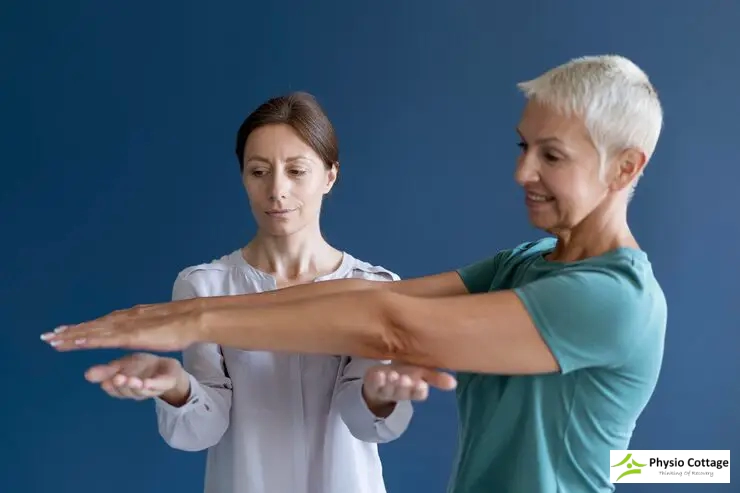Neck pain is a common issue that affects millions of people worldwide, whether from long hours at a desk, poor posture, or an injury like whiplash. While neck pain can be uncomfortable and limit your daily activities, physiotherapy is an effective way to relieve pain and improve neck function.
In this guide, we’ll answer the most common questions about physiotherapy for neck pain, explore different treatment techniques, and share practical tips for managing neck pain at home. Whether you’re looking for immediate relief or long-term recovery, this article will help you understand how physiotherapy can be your solution.
What Are the Main Causes of Neck Pain?
Understanding the root cause of your neck pain is essential to find the right treatment. The most common causes of neck pain include:
- Poor Posture: Sitting for long periods, especially at a desk or while using your phone, can strain your neck muscles.
- Muscle Strain: Repetitive movements or overuse, such as heavy lifting or working out with improper form, can lead to strained neck muscles.
- Injury or Trauma: Sudden injuries like whiplash from car accidents can damage the soft tissues in your neck, leading to pain and stiffness.
- Degenerative Conditions: Conditions such as arthritis or herniated discs can cause chronic neck pain over time.
- Stress and Tension: Emotional stress can lead to tension in the neck and shoulders, contributing to discomfort.
Identifying the cause will help your physiotherapist create a tailored treatment plan to target your specific issue.
☎️ Need Physiotherapy Services in Scarborough? Contact us
Can Physiotherapy Help with Neck Pain?
Yes! Physiotherapy is a non-invasive and effective approach to treating neck pain. It helps by:
- Relieving muscle tension
- Improving posture and alignment
- Increasing neck mobility
- Reducing pain through targeted exercises
Unlike pain medications, which only mask symptoms, physiotherapy aims to treat the underlying cause of your neck pain, giving you long-term relief.
Common Physiotherapy Techniques for Neck Pain
Here are the most common physiotherapy techniques used to treat neck pain:
1. Manual Therapy
Manual therapy involves hands-on techniques where the physiotherapist manipulates your muscles and joints. This helps to:
- Release muscle tension
- Reduce stiffness
- Improve mobility
Many patients find manual therapy especially helpful for relieving tightness and knots in the neck.
2. Posture Correction
Many neck pain issues stem from poor posture, especially with today’s screen-heavy lifestyle. Physiotherapists will work with you to:
- Identify your posture problems (like slouching)
- Teach you proper sitting and standing techniques
- Provide ergonomic advice (for your desk setup, phone use, etc.)
Correcting your posture not only helps reduce neck pain but also prevents it from coming back.
3. Exercise Therapy
Your physiotherapist will give you exercises that are designed to:
- Strengthen neck and shoulder muscles
- Improve flexibility
- Reduce stiffness
Here are some simple exercises you can try at home:
- Neck Stretches: Gently tilt your head toward each shoulder to stretch your neck muscles.
- Shoulder Rolls: Roll your shoulders backward and forward to relieve tension in the upper back and neck.
These exercises are easy to do and can be part of your daily routine to help keep neck pain at bay.
4. Heat and Cold Therapy
Physiotherapists often use heat or ice packs to reduce inflammation and relieve muscle pain. Cold therapy is used for acute pain, while heat therapy helps relax stiff muscles.
5. Dry Needling or Acupuncture
Some physiotherapists offer dry needling, where thin needles are inserted into specific points to relieve muscle tightness. This technique can be particularly effective for chronic neck pain or muscle spasms.
✔️ Read related article: How Many Physiotherapy Sessions Will I Need to Recover?
How Long Does It Take for Physiotherapy to Work for Neck Pain?
One of the most common questions people ask is, “How long will it take for my neck pain to improve?” The answer depends on several factors:
- The cause of your neck pain
- The severity of your condition
- How well you stick to the treatment plan and exercises
For mild cases like muscle strain, you may feel significant improvement after just a few sessions. For chronic conditions or injuries, it may take several weeks or months of regular physiotherapy.
What Should I Expect in My First Physiotherapy Session for Neck Pain?
Your first session will include an initial assessment where the physiotherapist will:
- Ask you about your medical history and current symptoms
- Perform a physical examination to assess the range of motion and check for muscle tightness or joint problems
- Develop a personalized treatment plan based on your condition
The physiotherapist will also explain what exercises or techniques they will use to help you get better.
Can I Do Anything at Home to Manage My Neck Pain?
Yes, there are several things you can do to speed up your recovery and prevent future neck pain:
1. Maintain Good Posture
Ensure your workstation is ergonomically set up. Your computer screen should be at eye level, and your chair should support your lower back.
2. Take Regular Breaks
If you spend long hours sitting, take breaks every 30 minutes to stretch your neck and back.
3. Apply Heat or Cold Packs
Use a cold pack in the first 48 hours of acute pain to reduce inflammation. After that, switch to heat therapy to relax stiff muscles.
4. Perform Daily Neck Stretches
Make neck stretches part of your daily routine to keep your neck muscles flexible. Start with gentle stretches and gradually increase intensity.
✔️ Read related article: How Long Does It Take for Physiotherapy to Show Results?
When Should You See a Physiotherapist?
If you’ve tried home remedies and your neck pain persists for more than two weeks, or if your pain is accompanied by numbness, tingling, or weakness in your arms, it’s time to see a physiotherapist.
Sum Up
Physiotherapy offers a holistic, non-invasive approach to treating neck pain. From posture correction to targeted exercises, physiotherapy can help you manage pain and improve your overall quality of life. If you’re struggling with neck pain, don’t wait—schedule an appointment with a physiotherapist today to start your path to recovery.









